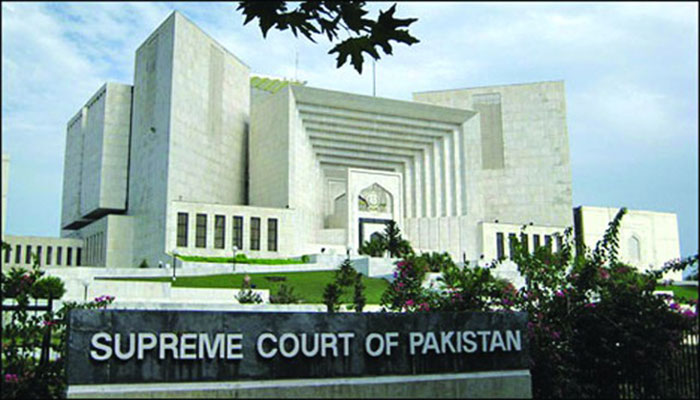If legislation is made against court decisions: Where independence of judiciary would stand, asks SC
ISLAMABAD: The Supreme Court of Pakistan on Wednesday questioned where the independence of judiciary would stand if legislation is made against the court decisions.
A three-member bench of the apex court, headed by Justice Umar Ata Bandial, heard the review petitions filed by the government and sacked employees against the court judgment striking down the Sacked Employees (Reinstatement) Act 2010. The court directed Attorney General Khalid Javed to submit a detailed separate list of employees who were reinstated through an ordinance and an act. The court directed the attorney general to also submit a separate list of employees working in government and semi-government departments.
During the course of hearing, Justice Syed Mansoor Ali Shah questioned if legislation is made against court decisions, where the independence of judiciary would stand. Justice Umer Ata Bandial observed that the parliament could not make decisions on the basis of sympathies, adding that legislation should not have been made in 2010 in view of the 2003 court decision.
Latif Khosa, counsel for sacked employees of SNGPL and State Life Insurance, while continuing his arguments, told the court that the employees were sacked after the PPP government. He claimed that the PPP had restored the judges removed by a dictator. The PPP in its election slogan had promised that it would reinstate the sacked employees, Khosa submitted and claimed that they have ended the culture of political victimization. He submitted that the employees were appointed in accordance with the law.
Justice Mansoor Ali Shah asked Khosa that illegal appointments might have been made since 1947, then why few employees were reinstated.
Khosa replied that the sacked employees had approached the court for relief, adding that the court restored some of the employees.
Justice Mansoor Ali Shah remarked legislation could not be made against court decisions. “Whether the parliament can acquit anyone punished by a court of law through legislation,” he questioned. Justice Umer Ata Bandial observed that the employees who had filed the review petitions were appointed on a temporary basis. He observed that those who were employed in 1996 were removed in 1997 and they served only for six months, adding that the 2003 court decision was related to employees who served for 10 years and were recruited in 1988-89.
Khosa contended that before 2021, no court had given a decision against the employees. “This is the basic question as to why the sacked employees did not approach the court,” Justice Mansoor Ali Shah questioned and asked Khosa why it was not mentioned in the 2010 act that as injustice was made to the employees, hence they were reinstated.
Shahbaz Khosa, another counsel for State Life, told the court that the employees sacked through an ordinance had approached the high court but the court did not decide the matter as the Supreme Court was hearing the review petitions. He submitted that the apex court had struck down the Sacked Employees (Reinstatement) Act 2010, whereby his clients were sacked although their matter did not fall into the act of parliament.
He told the court that the majority of employees were reinstated through an ordinance promulgated in 2009. He pleaded to give them the right to approach the high court. Justice Umer Ata Bandial asked the counsel how their rights could be restored after the ordinance remains no more.
The attorney general suggested to the court that it would be appropriate that the high court continue to hear the matter of those employees reinstated through an ordinance. Justice Bandial observed that they need the assistance of the attorney general on important questions and adjourned the hearing for today (Thursday).
-
 Leonardo DiCaprio's Girlfriend Vittoria Ceretti Given 'greatest Honor Of Her Life'
Leonardo DiCaprio's Girlfriend Vittoria Ceretti Given 'greatest Honor Of Her Life' -
 Beatrice, Eugenie’s Reaction Comes Out After Epstein Files Expose Their Personal Lives Even More
Beatrice, Eugenie’s Reaction Comes Out After Epstein Files Expose Their Personal Lives Even More -
 Will Smith Couldn't Make This Dog Part Of His Family: Here's Why
Will Smith Couldn't Make This Dog Part Of His Family: Here's Why -
 Kylie Jenner In Full Nesting Mode With Timothee Chalamet: ‘Pregnancy No Surprise Now’
Kylie Jenner In Full Nesting Mode With Timothee Chalamet: ‘Pregnancy No Surprise Now’ -
 Laura Dern Reflects On Being Rejected Due To Something She Can't Help
Laura Dern Reflects On Being Rejected Due To Something She Can't Help -
 HBO Axed Naomi Watts's 'Game Of Thrones' Sequel For This Reason
HBO Axed Naomi Watts's 'Game Of Thrones' Sequel For This Reason -
 King Charles' Sandringham Estate Gets 'public Safety Message' After Andrew Move
King Charles' Sandringham Estate Gets 'public Safety Message' After Andrew Move -
 Lewis Capaldi Sends Taylor Swift Sweet Message After 'Opalite' Video Role
Lewis Capaldi Sends Taylor Swift Sweet Message After 'Opalite' Video Role -
 Brooklyn Beckham Plunges Victoria, David Beckham Into Marital Woes: ‘They’re Exhausted As It Seeps Into Marriage
Brooklyn Beckham Plunges Victoria, David Beckham Into Marital Woes: ‘They’re Exhausted As It Seeps Into Marriage -
 Sarah Ferguson Joins Andrew In ‘forcing’ Their Daughters Hand: ‘She Can Lose Everything’
Sarah Ferguson Joins Andrew In ‘forcing’ Their Daughters Hand: ‘She Can Lose Everything’ -
 'Bridgerton' Author Reveals If Actors Will Be Recast In Future Seasons
'Bridgerton' Author Reveals If Actors Will Be Recast In Future Seasons -
 50 Cent Super Bowl Ad Goes Viral
50 Cent Super Bowl Ad Goes Viral -
 'The Housemaid' Lifts Company's Profits: Here's How
'The Housemaid' Lifts Company's Profits: Here's How -
 Michael Douglas Recalls Director's Harsh Words Over 'Wall Street' Performance
Michael Douglas Recalls Director's Harsh Words Over 'Wall Street' Performance -
 Henry Czerny On Steve Martin Created Humor On 'Pink Panther' Set
Henry Czerny On Steve Martin Created Humor On 'Pink Panther' Set -
 Lady Victoria Hervey: Andrew Mountbatten-Windsor's Ex-girlfriend Proud Of Being On Epstein Files
Lady Victoria Hervey: Andrew Mountbatten-Windsor's Ex-girlfriend Proud Of Being On Epstein Files




